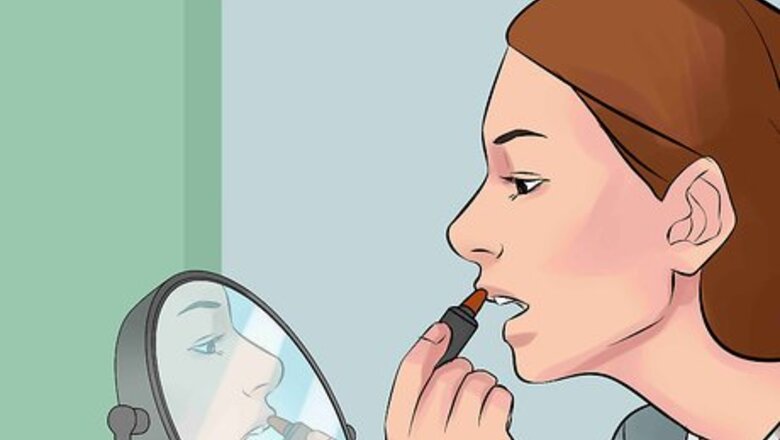
views
Putting on Your Base Makeup
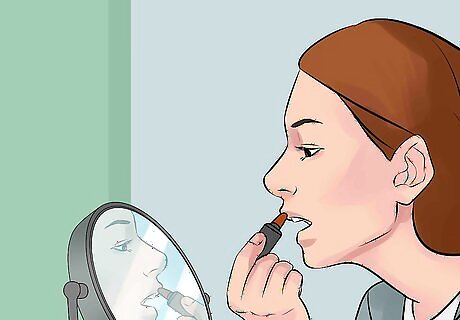
Work with a makeup mirror. If you are farsighted enough that you have trouble seeing the mirror with your glasses on, find a makeup mirror with a magnified side to help you out. Many rotating makeup mirrors have two sides, one an ordinary mirror and one a "zoomed-in" lens.
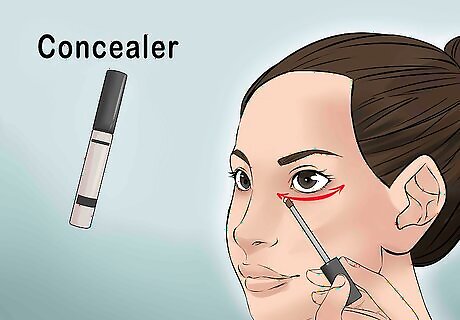
Apply some concealer under your eyes with a brush. This will help hide dark circles and brighten up your eyes. Lightly dab it into the area under your eyes using a brush or your ring finger. Blend it downwards in a V shape. Go for a yellow-tinted concealer under the eyes. This will work against the bluish, grayish colors, and help hide them further.
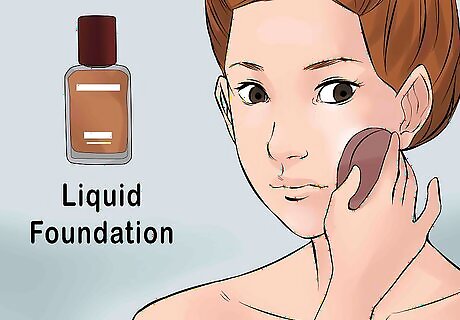
Apply liquid foundation using a foundation brush or sponge. You can apply the foundation all over your face, or just on the trouble spots, such as your nose and cheeks. Be sure to blend in well.
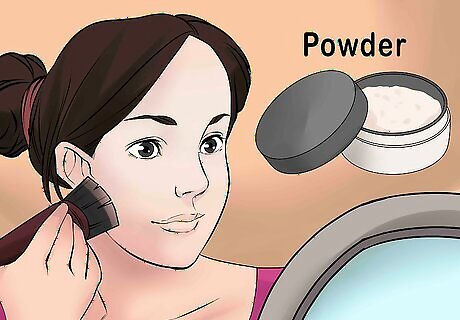
Set your foundation and concealer with some powder. Focus on the areas beneath your eyes and in the T-zone (the nose, forehead, chin, and cheekbones). This will help set the makeup, and keep it from smudging throughout the day. Put extra powder on the bridge of your nose where your glasses rest, as sweat tends to gather here. If the extra powder doesn't do the trick, reduce the amount of makeup in that area to make smudging less obvious.
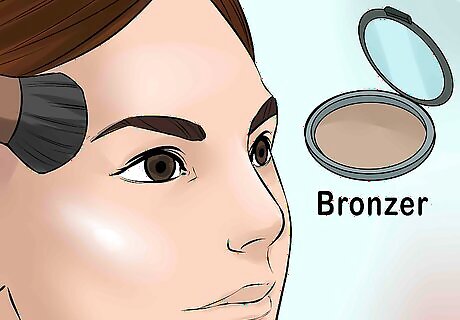
Consider using some bronzer for a sun-kissed look. Using a large, fluffy brush, dust on some bronzer across your nose and forehead, chin, and the tops of your cheeks.
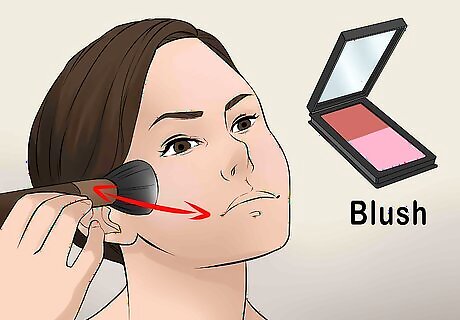
Keep blush to a minimum. A light dust of blush is fine, but it's easy to go over the top when glasses already make your face stand out. If you do use blush, apply it on the apple of your cheeks. Blend it back towards the top of your ear, and down towards your jaw line. If your glasses are made from wire or colored plastic, try a matte blush. If your glasses have a tortoise shell pattern, try a blush with a slight shimmer. Apply on top of your cheekbones instead for a more angled look. EXPERT TIP "If you want to create a really natural, dewy look, skip the powder, then dab lip stain onto your cheeks and blend it in." Cassandra McClure Cassandra McClure Makeup Artist Cassandra McClure is a clean beauty advocate, working to increase use of sustainable and healthy cosmetics, based in Palo Alto, California. She has worked in the beauty and cosmetic industries for over 15 years, as a model, makeup artist, and entrepreneur. She has a Masters in High Definition Makeup from the MKC Beauty Academy. Cassandra McClure Cassandra McClureMakeup Artist
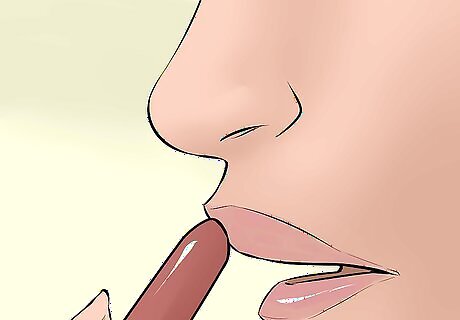
Choose your lipstick. The general rule for makeup is that you either pair bold eyeshadow with neutral lips, or bold lipstick with neutral eyeshadow. Since glasses accentuate your eyes, the right choice is usually a clear gloss, nude lipstick, or another subtle shade. If your glasses have thin frames and you'd like to minimize the attention on your eyes, you can try a bolder lipstick, but this is more difficult to pull off. If you're feeling extra bold, you can pair cat-eye glasses with a deep berry or wine lip color for a "sexy secretary" look. Consider lipstick that matches or complements the color of your glasses frames.
Applying Eyeshadow

Consider applying an eyeshadow primer all over your lid first. The eyeshadow primer will help the eyeshadow stick on better. It will also help make the colors stand out better, a must for those who'd like a bolder look.
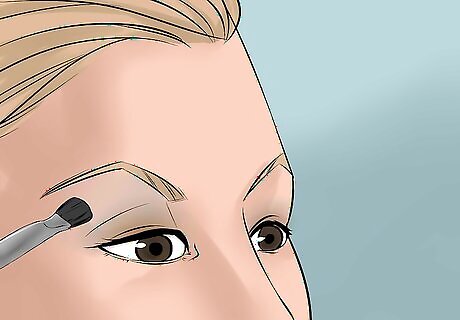
Choose a light color to make your eyes look larger. This counteracts the effect of nearsighted glasses, especially at the corner of your eye. If you'd like a neutral look, choose a creamy color that is a few shades lighter than your skin tone. If you'd like something bolder and more colorful, choose a color that matches the lightest tone on your face. In general, people with glasses should avoid vibrant eyeshadow colors. Most makeup artists agree that the thinner and more delicate frames you have, the softer and more natural your eyeshadow should be. Use a fluffy eyeshadow brush to apply this all over your eye, from lash line to eyebrow. Keep it to a light touch, since your glasses will already draw attention to your eyes. This is especially important if you are far-sighted, as reading glasses magnify the eyes.
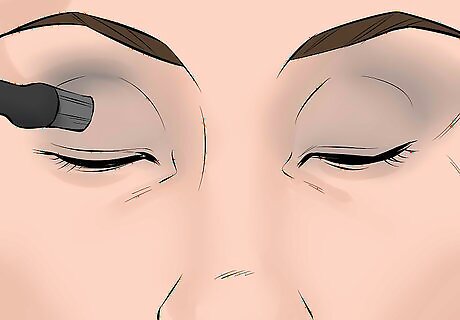
Enhance with a slightly darker color for thick frames. If you have thick, chunky frames, such as tortoise shell frames, consider going darker and bolder. One approach is to use a light color as your base over the entire lid, then a darker color just on your upper lids. If you'd like a more natural look, choose a brown that is a few shades darker than your skin tone. If you are going bold and colorful, choose a color that is a few shades darker than the base color. Apply the darker color from the lash line to the crease using an angled brush. Blend it in upwards, just past the crease, towards your brow bone.
Doing Your Eyeliner
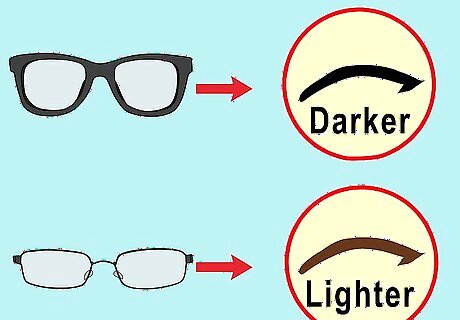
Choose a darker color for thicker frames, and a lighter color for thinner frames. Your eyes can get easily lost behind thick glasses, so a darker eyeliner, ideally black, will help them stand out better. If you have thin, delicate frames, consider using a lighter color, such as dark brown or espresso.
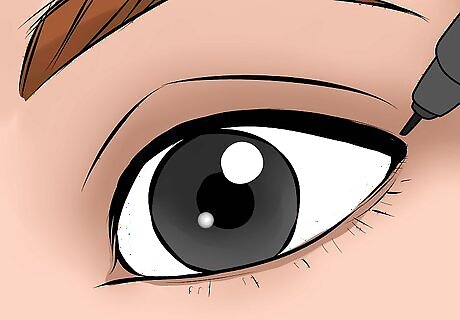
Consider tightlining your upper eyelid. Glasses draw attention to your eyes already, and make it easy to overdo your makeup. "Tightlining" outlines your eyes in a thin, nearly invisible band of eyeliner, and is one of the few looks that works with any frames. If you're interested in other styles, keep reading for alternatives. Tightlining may not be the right choice if you are far-sighted and trying to counteract the "shrinking" effect reading glasses have on your eyes.
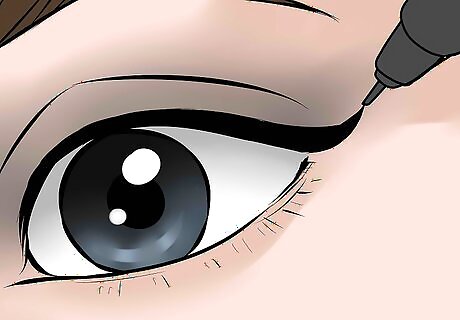
Taper your eyeliner if you have wire frames. Start at the inner corner of your eye, and end at the outer corner. Make the line thicker as you get towards the outer corner of your eye. Consider finishing off with a slight flick. Exaggerate this effect with a cat eye for a bold look that pairs well with square glasses.
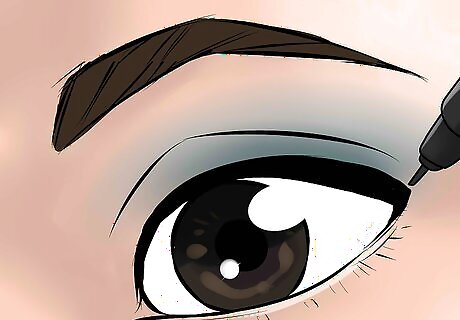
Use thicker eyeliner for thicker frames. The general rule is that the thicker your glasses are, the thicker your eyeliner should be. Start on the inner corner of your eye, and finish on the outer. Black will offer the most contrast, and really make your eyes pop. This will also help if you are near-sighted and unhappy with how your glasses make your eyes look smaller If you have really chunky frames, consider applying some dark brown/espresso eyeshadow on your lower lashes. Apply it with an eyeliner brush, and make it meet the top line with a slight V shape. Even with thick eyeliner, avoid a smoky look, which can look sloppy through your glasses lens. Keep everything neat and well-defined.
Handling Eyelashes and Eyebrows
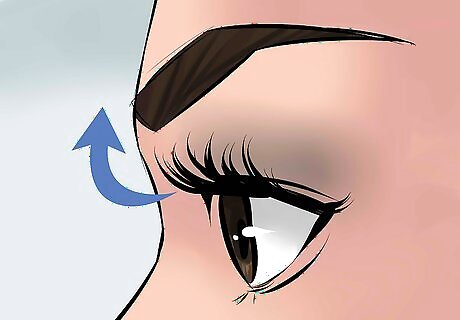
Curl your eyelashes. If you plan to put on mascara, it's best to curl your eyelashes first. Without curling, your eyelashes may brush up against your lenses, smearing them with mascara. If you skip this step, use little to no mascara.
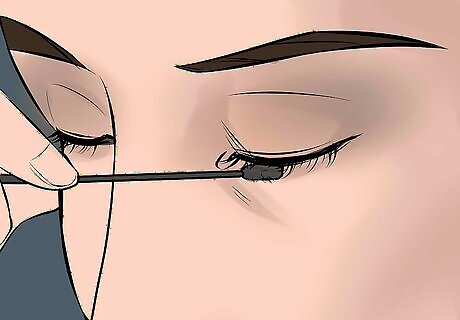
Apply one to two coats of mascara. The thicker your frames are, the heavier your lashes should be. Lower your lids, and bring the mascara wand as close to the base of your lashes as possible. Slowly bring the wand upward. Most people find that it is easiest to start in the center of your lash line, and then to do the sides. Use smooth, upward strokes for thin frames. This also works for tortoise shell frames. Use a zigzag or side-to-side motion for chunky frames.
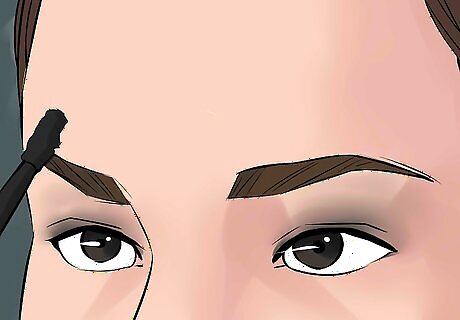
Make sure your eyebrows are neatly groomed. You don't have to go out and wax them, but you want to make sure that they look nice. Eyeglasses draw attention to your eyes, after all. Tweeze out any stray hairs, then comb your brows upward towards the arch using a brow brush.
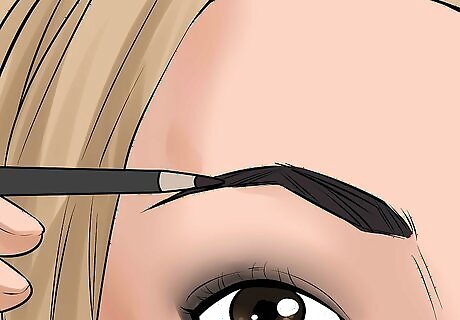
Fill any sparse areas using an angled brush and eyebrow powder or an eyebrow pencil. Try to match your natural eyebrow color as best you can. Define your brows with short strokes of the eyebrow pencil. Brush straight up to blend the color into your eyebrows. If you have really light-colored eyebrows, consider going one or two shades darker. If you have black eyebrows, use a very dark brown or charcoal color, never black. Tone down the eyebrow makeup if you have really thick or chunky frames.
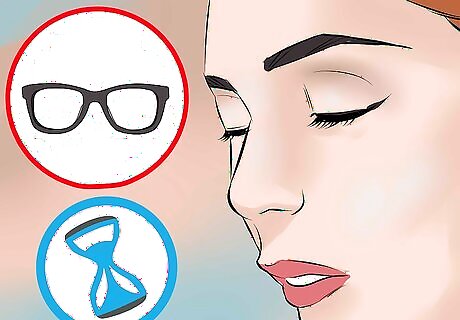
Wait for your makeup to dry before putting on your glasses. Make sure your makeup is dry to the touch so your glasses don't smear it. This is particularly important with mascara.










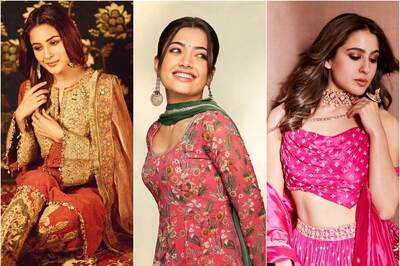





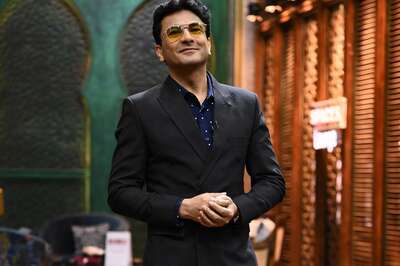
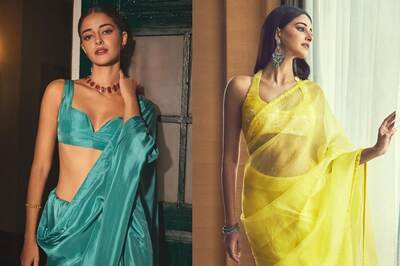


Comments
0 comment